Families of enforced disappeared Tamils decry domestic investigations
[TamilNet, Sunday, 30 August 2015, 15:38 GMT]
Around 1,200 people from all the 8 districts of North-East came together at an emotional gathering on Sunday at the De La Salle Brothers School in Mannaar, remembering the enforced disappeared persons in the country of Eezham Tamils. On the occasion of the International Day of the Disappeared, the families of enforced disappeared demanded independent international investigations and categorically rejected the domestic and so-called hybrid mechanisms that are currently being advocated by the USA. In the meantime, leading lawyers from Mannaar told TamilNet on Sunday that international investigations were necessary on the mass graves at the killing fields of Mannaar. On Friday, an abandoned well allegedly used by the SL military to dump slain Tamils was located 40 meters close to Maanthai Junction near Thirukkeatheesvaram temple.
Around 1,200 people from all the 8 districts of North-East came together at an emotional gathering on Sunday at the De La Salle Brothers School in Mannaar, remembering the enforced disappeared persons in the country of Eezham Tamils. On the occasion of the International Day of the Disappeared, the families of enforced disappeared demanded independent international investigations and categorically rejected the domestic and so-called hybrid mechanisms that are currently being advocated by the USA. In the meantime, leading lawyers from Mannaar told TamilNet on Sunday that international investigations were necessary on the mass graves at the killing fields of Mannaar. On Friday, an abandoned well allegedly used by the SL military to dump slain Tamils was located 40 meters close to Maanthai Junction near Thirukkeatheesvaram temple.
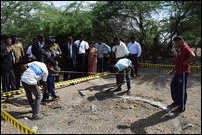
An
abandoned well, allegedly used by the SL military to dump slain Tamils,
was located on Friday, 40 meters from Maanthai Junction towards
Thirukkeatheesvaram temple
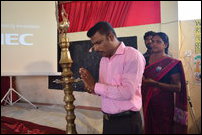
NPC Councillor Primussiraiva inaugurating the event at Mannaar on the International Day of the Disappeared

Mothers of enforced disappeared Eezham Tamils from 8 districts gathered at Mannaar on Sunday
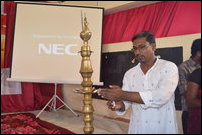
Rev Fr Elil Rajendram
Northern Provincial Councillor Mr
Antony Soosairatnam Pirimussiraiva, who is a leading lawyer in Mannaar,
representing the families of the enforced disappeared told TamilNet
Sunday that international investigations only could establish the truth
about the mass graves.
Rev Fr Emmanuel Sebamalai, who is the president of the Citizens' Committee of Mannaar, openly declared that the global powers have exploited the fate of Tamil victims for their selfish gains. Tamils, who expected justice from global players are now told expect justice from a domestic mechanism. Tamils have to either succumb to the unfortunate situation that has befallen them or prepare themselves to resist the designs and dramas being staged by these powers, even though the Tamils are already exhausted with all the forms of struggle in their long journey to justice, he said.
Rev Fr Elil Rajendram, the country Director of Jesuit Refugee Service and a co-spokesperson of Tamil Civil Society Forum was the chief guest in the event organised by the AFVED and the Mannar Citizens' Committee.
In his address, Fr Elil Rajendram urged the people to find creative ways to advance their struggle for justice in the changed context, reminding the audience that enforced disappearances were part of the genocidal project. Fr Elil Rajendram cited the example of the legal project undertaken by the mothers of enforced disappeared in Argentina. SL State structure played a crucial role in the enforced disappearances, he said.
Tamils should structure their own terminology and be in command of their own narrative in conveying and documenting their experiences instead of expecting others to steer the process, Fr. Elil Rajendram concluded.
Mrs M Uthayachandran, the president of the AFVED, in her address said the association had taken up the burning issue of the enforced disappeared and the political prisoners with both the SL President Maithiripala Sirisena and SL Prime Minister Ranil Wickramasinghe. Both of them were pre-occupied with the votes of the Tamil people. There has been no progress on the critical issues, she told the families who had gathered at the venue.
Rev Fr Emmanuel Sebamalai, who is the president of the Citizens' Committee of Mannaar, openly declared that the global powers have exploited the fate of Tamil victims for their selfish gains. Tamils, who expected justice from global players are now told expect justice from a domestic mechanism. Tamils have to either succumb to the unfortunate situation that has befallen them or prepare themselves to resist the designs and dramas being staged by these powers, even though the Tamils are already exhausted with all the forms of struggle in their long journey to justice, he said.
Rev Fr Elil Rajendram, the country Director of Jesuit Refugee Service and a co-spokesperson of Tamil Civil Society Forum was the chief guest in the event organised by the AFVED and the Mannar Citizens' Committee.
In his address, Fr Elil Rajendram urged the people to find creative ways to advance their struggle for justice in the changed context, reminding the audience that enforced disappearances were part of the genocidal project. Fr Elil Rajendram cited the example of the legal project undertaken by the mothers of enforced disappeared in Argentina. SL State structure played a crucial role in the enforced disappearances, he said.
Tamils should structure their own terminology and be in command of their own narrative in conveying and documenting their experiences instead of expecting others to steer the process, Fr. Elil Rajendram concluded.
Mrs M Uthayachandran, the president of the AFVED, in her address said the association had taken up the burning issue of the enforced disappeared and the political prisoners with both the SL President Maithiripala Sirisena and SL Prime Minister Ranil Wickramasinghe. Both of them were pre-occupied with the votes of the Tamil people. There has been no progress on the critical issues, she told the families who had gathered at the venue.

- [Tamil] Address by Fr Elil Rajendram
The
Association of Families of Victims of Enforced Disappeared (AFVED), in
an appeal sent to Sri Lanka's President Maithiripala Sirisene,
categorically rejected domestic and hybrid mechanisms.
“We firmly believe that justice can only be meted out through the creation of an international tribunal mechanism,” stated the memorandum sent by the AFVED to SL President Maithiripala Sirisena on behalf of the victims of enforced disappeared. The memorandum was signed by Mrs. M.Uthayachandra and Mrs. T.Puspambal, the secretary of the AFVED.
Interpreting the mandate given by the UNHRC to the OISL, also as giving space to address the crime of genocide, the AFVED argued that the Sri Lankan State, controlled almost exclusively by the Sinhala ethnic group, will not be able to adjudicate any charge of genocide by the Sri Lankan State against the Tamils, whether as part of a hybrid mechanism or a domestic mechanism. “Therefore an outside, independent international mechanism is essential for a fair adjudication of the crimes which fall within the purview of the mandate” the memorandum stated.
Given the history and politics of Sri Lanka, a domestic or hybrid mechanism will not meet these standards and thus the only fair option is an international process led by the UN, the memorandum further stated.
“We firmly believe that justice can only be meted out through the creation of an international tribunal mechanism,” stated the memorandum sent by the AFVED to SL President Maithiripala Sirisena on behalf of the victims of enforced disappeared. The memorandum was signed by Mrs. M.Uthayachandra and Mrs. T.Puspambal, the secretary of the AFVED.
Interpreting the mandate given by the UNHRC to the OISL, also as giving space to address the crime of genocide, the AFVED argued that the Sri Lankan State, controlled almost exclusively by the Sinhala ethnic group, will not be able to adjudicate any charge of genocide by the Sri Lankan State against the Tamils, whether as part of a hybrid mechanism or a domestic mechanism. “Therefore an outside, independent international mechanism is essential for a fair adjudication of the crimes which fall within the purview of the mandate” the memorandum stated.
Given the history and politics of Sri Lanka, a domestic or hybrid mechanism will not meet these standards and thus the only fair option is an international process led by the UN, the memorandum further stated.
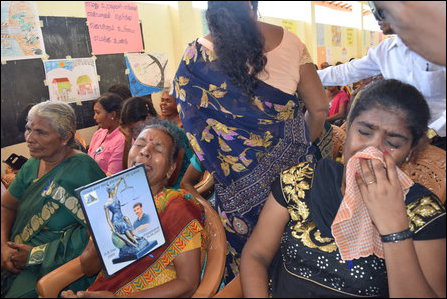
Full text of the memorandum by AFVED follows:
We the undersigned civil societies members. The Association of relatives of Enforced Disappeared Would likes to submit our grievances to you. As there is a change of leadership of the country and a new parliament has come into power, we hope and expect many good things to happen in the near future.
We submit this memorandum to responsibly convey to you that neither a domestic mechanism nor a hybrid mechanism would be able to deliver justice to Tamil victims in Sri Lanka. We firmly believe that justice can only be meted out through the creation of an international tribunal mechanism.
In the UN Expert Panel Report on Accountability in Sri Lanka (March 31, 2011) it is stated “Accountability also requires official acknowledgement by the State of its role and responsibility in violating the rights of its citizens when that has occurred.” When the State itself is implicated in international crimes, it cannot play any role in the administration of justice pertaining to those crimes. As the accepted legal principle holds, “an accused cannot be judge in one’s own case”.
The underlying nature of the conflict in Sri Lanka is an ethnic conflict. Given that, for a State to play a role in its resolution, it must be ethnically neutral.
However, as demonstrated by Sri Lanka’s history since “independence”, the Sri Lankan State, including the judiciary, has failed to uphold even the appearance of neutrality.
The judiciary has always been subservient to the political leadership when it comes to abuses against Tamils, and that is evidenced by all of the past Commissions of Inquiry.
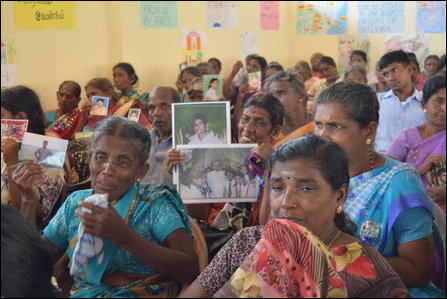
The mandate of the OISL is not limited to war crimes, but also includes international crimes, which is further defined in Article V of the Rome Statute of the International Criminal Court as consisting of the crime of genocide; crimes against humanity; war crimes; and the crime of aggression.
Article II of the 1948 Genocide Convention defines genocide to mean “any of the following acts committed with intent to destroy, in whole or in part, a national, ethnical, racial or religious group as such.”
By this very definition of genocide, the Sri Lankan State, controlled almost exclusively by the Sinhala ethnic group, will not be able to adjudicate any charge of genocide by the Sri Lankan State against the Tamils, whether as part of a hybrid mechanism or a domestic mechanism. Therefore an outside, independent international mechanism is essential for a fair adjudication of the crimes which fall within the purview of the mandate.
It has been the belief in some quarters that the changing of the guard would result in a change in institutionalized impunity in Sri Lanka. The Tamils have seen numerous regime changes since Sri Lanka becoming an independent State in 1948, and none of the regimes made any sincere effort to address Tamil grievances.
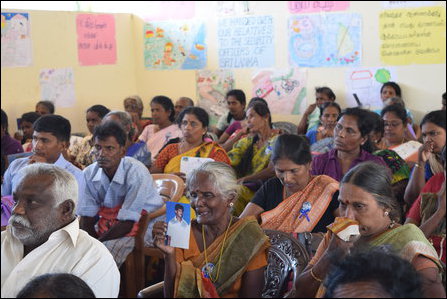
The promotion of former Army Chief Sarath Fonseka to Field Marshal and the recent appointment of former Commander of the notorious 57th division Major General Jagath Dias to Army Chief of Staff, both of whom have been implicated in grave international crimes by reputable INGOs, is not only a slap on the face to the victims, but also to the OISL, an open flaunting of the accountability demanded of the Sri Lankan State.
None of Sri Lanka’s domestic mechanisms, including the one that had the International Independent Group of Eminent Persons, has been successful. Accountability and justice are processes that must be credible in the view of the victims, ensuring the free participation of the victims, and complying with international norms and standards.
Further, given that the exclusively Sinhalese Sri Lankan military apparatus is still intact, and given the intense militarization of the North East where the Tamil victims live, the Tamils will continue to be fearful to participate in any in-country process.
Given the history and politics of Sri Lanka, a domestic or hybrid mechanism will not meet these standards and thus the only fair option is an international process led by the UN.
A hybrid tribunal can be useful, where a state has the will, but lacks the capacity to deliver justice. This is not the case in Sri Lanka, because there is no political will to prosecute members of the Sinhala Nation or to deliver justice to the Tamils. Even the Foreign Minister of Sri Lanka recently told the Southern constituency that they will set up domestic inquiry “to clear the name of the army.”
Therefore we would like to request to refer the case to the International Criminal Court or create an international accountability process, rather than to support for a domestic or a hybrid judicial mechanism
With great respect for your commitment and work to protect and promote human rights in Sri Lanka, to ensure justice and accountability, to build deterrence, and to ensure that injustices are never repeated.
Thanking you in anticipation.
(Signed)
Mrs. M.Uthayachandra
President
(Signed)
Mrs. T.Puspambal Secretary
கருத்துகள் இல்லை:
கருத்துரையிடுக